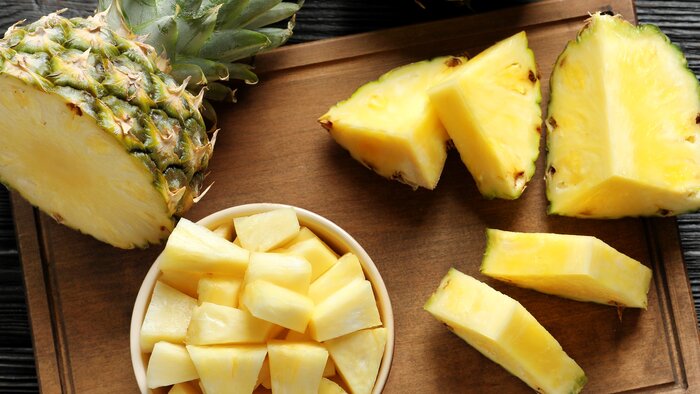Pineapple Nutrition: Understanding the Facts About Calories, Protein, Fat, Carbs, and Vitamins
Pineapples are a delicious tropical fruit that is packed with nutrients, making them a healthy addition to any diet. In this article, we will dive deep into the nutritional benefits of pineapples, including their calorie content, protein, fat, carbs, and vitamins.
What Is Pineapple

Pineapple is a tropical fruit that is native to South America but is now widely cultivated in many other parts of the world. This sweet fruit is low in calories and packed with nutrients, making it an excellent addition to any healthy diet.
In this article, we will explore the nutritional benefits of pineapple, including its calorie content, protein, fat, carbs, and vitamins. We will also discuss the health benefits of pineapple and how you can easily incorporate this delicious fruit into your diet.
Pineapple Calories
One cup of diced pineapple contains approximately 82 calories, making it a low-calorie snack or addition to a meal. This is due to the fact that pineapples are primarily made up of water and carbohydrates.
Protein Pineapple
While pineapples are not a significant source of protein, they do contain small amounts. One cup of diced pineapple contains approximately 0.9 grams of protein. While this may not seem like much, every little bit helps when it comes to meeting your daily protein needs.
Pineapple Fat - How Much Fat In Pineapple

Pineapples are virtually fat-free, making them an excellent choice for those who are watching their fat intake. One cup of diced pineapple contains less than 1 gram of fat.
Carbs In Pineapple
Pineapples are a good source of carbohydrates, with one cup of diced pineapple containing approximately 21 grams of carbs. The majority of these carbs come from sugar, which is what gives pineapple its sweet taste.
Pineapple Vitamins - What Vitamins Do Pineapple Have
Pineapples are an excellent source of vitamins, including vitamin C, vitamin B6, and folate. One cup of diced pineapple contains approximately 79 milligrams of vitamin C, which is more than the daily recommended intake for adults. Vitamin C is an antioxidant that helps protect your body from damage caused by free radicals.
Health Benefits of Pineapple
In addition to being low in calories and high in vitamins, pineapples also offer a range of health benefits. These include:
Improved Digestion: Pineapples contain bromelain, an enzyme that helps break down protein in the body. This can help improve digestion and prevent digestive issues such as bloating and constipation.
Boosted Immunity: Vitamin C, which is found in high amounts in pineapples, can help boost your immune system and reduce your risk of getting sick.
Reduced Inflammation: Bromelain has anti-inflammatory properties that can help reduce inflammation in the body. This can be beneficial for those with inflammatory conditions such as arthritis.
Improved Heart Health: Pineapples are a good source of potassium, which can help regulate blood pressure and reduce your risk of heart disease.
How To Incorporate Pineapple In Diet
There are many easy ways to incorporate pineapple into your diet. Some ideas include:
Eating fresh pineapple as a snack
- Adding diced pineapple to smoothies or yogurt bowls
- Grilling pineapple and using it as a topping for burgers or salads
- Using canned pineapple in stir-fries or on top of pizza
Is Pineapple Good For You?
Yes, pineapple is good for you! It is a nutrient-dense fruit that offers a variety of health benefits. Pineapple is low in calories and high in vitamins, minerals, and fiber, making it a great choice for maintaining a healthy diet.
In conclusion, pineapples are a delicious and nutritious fruit that can be easily incorporated into a healthy diet. They are low in calories, high in vitamins, and offer a range of health benefits, including improved digestion, boosted immunity, reduced inflammation, and improved heart health. With a little creativity, you can easily add pineapple to your meals and snacks in a variety of ways.